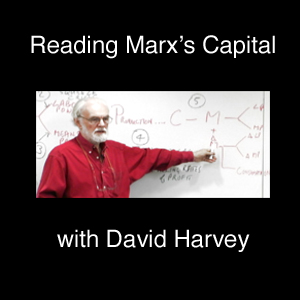

Reading Marx's Capital (audio)
David Harvey
A close reading of the text of Karl Marx's Capital Volume I in 13 lectures by Professor David Harvey.
Episodes
Mentioned books

Sep 11, 2008 • 1h 19min
Class 13 - Conclusion
Professor David Harvey discusses topics like historical foundations of capital, class inequalities, capitalist investment strategies, global trade systems, theories on capitalist crisis, debate on profit rates, and the relevance of class struggle in contemporary society.

Sep 4, 2008 • 1h 25min
Class 12 - Chapters 26-33
Professor David Harvey discusses Marx's critical views on colonies, wealth inequality, violent origins of capitalism, social justice, rise of capitalist agriculture, force in societal transformation, accumulation by dispossession, and reflections on concluding Marx's Capital.

Aug 28, 2008 • 1h 58min
Class 11 - Chapter 25
Professor David Harvey discusses Marx's analysis of capitalism, including the working day, machinery, labor relationships, and capital accumulation. He explores the negative impacts of unrestrained capitalism, the composition of capital, labor dynamics, falling profit rate, technological impact, and wealth accumulation in global economies.

Aug 21, 2008 • 1h 44min
Class 10 - Chapters 16-24
Professor David Harvey delves into the intricacies of surplus value, collective labor, capitalist wage systems, and the dynamics of capitalist reproduction. He critiques foundational assumptions in capitalist analysis and explores the continuous accumulation of capital within the system, highlighting the coercive nature of reinvestment and the integral role of workers in production expansion.

Aug 19, 2008 • 1h 22min
Class 09 - Chapter 15 continued
Professor David Harvey discusses the impact of machinery on labor within capitalist systems, emphasizing its role in shaping social relations and class struggle. The podcast explores the challenges faced by displaced workers, the evolution of surplus reproduction and capital projects, and the adaptation of labor processes to seasonal demands and just-in-time systems. It also delves into the reorganization of labor in factory systems and Marx's insights on education, technology, and family dynamics.

Aug 6, 2008 • 1h 38min
Class 08 - Chapter 15
Professor David Harvey discusses Marx's theories on capitalism, crisis, and societal change, emphasizing insights on the transition to socialism. Topics include the evolution of industrial machinery, the impact of machinery on capitalistic production, and the interconnected issues in urban planning and social transformation.

Jul 18, 2008 • 1h 41min
Class 07 - Chapters 12-14
Professor David Harvey discusses the impact of rising productivity on the value of labor power, innovation, competition, and surplus value in capitalism. The podcast explores the historical significance of the Manchester School's campaign for cheaper bread, the influence of collective interests on economic policies, and the evolution of cooperation and division of labor under capitalism.

Jul 11, 2008 • 1h 47min
Class 06 - Chapters 10-11
Professor David Harvey dives into the essence of Marx's Capital Volume I, exploring labor time in capitalism, the historical struggle over the working day, exploitation of time and labor, and the dual nature of worker struggles. He also delves into climate change's impact on capitalism, collective versus individual responsibility in social issues, and the welfare state's evolution amidst privatization and class dynamics.

Jul 4, 2008 • 1h 36min
Class 05 - Chapters 7-9
Professor David Harvey discusses chapters 7-9 of Marx's Capital, delving into topics such as commodity, use value, exchange value, labor, value, money, labor power, technology, surplus value, profit generation, and the capitalist system from a worker's perspective.

Jun 27, 2008 • 1h 37min
Class 04 - Chapters 4-6
Professor David Harvey discusses the transition to surplus value in Marx's Capital, the dynamics of capital circulation, origins of capitalism from merchants to industrial capital, and the empowerment struggles in the labor market and production process.


